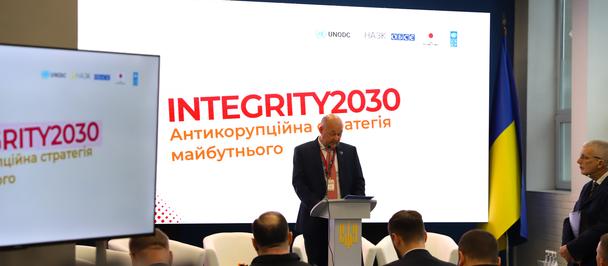With UNDP support a series of training events on ensuring rights to information under martial law took place, covering all the oblasts of Ukraine.
Accelerating access to information during the war
March 3, 2023

Kyiv, 3 March 2023 — Timely access to reliable official information is of critical importance during the times of crisis caused by the war. With support from the United Nations Development Programme (UNDP) in Ukraine and the Government of Denmark, and in partnership with the Ukrainian Parliament Commissioner for Human Rights, the final awareness raising event on access to information took place in Kyiv.
For three months UNDP Ukraine experts on access to information conducted interregional events dedicated to ensuring the right to information in the war setting. During the final event in Kyiv, Svitlana Kolyshko, UNDP Ukraine Human rights team lead and Human Rights for Ukraine Project Coordinator, noted that prompt access to information of high social relevance is not only crucial, but also sometimes lifesaving in times of war.
“In times of crisis, a person’s decisions should be grounded on accurate and timely information. During the war setting, public authorities and local self-government bodies are sometimes the only source of complete and reliable information: this imposes significant responsibility on information holders,” said Ms Kolyshko.
The Head of the Secretariat of the Ukrainian Parliament Commissioner Roman Romaniuk, stressed that there is a high demand for prompt and efficient communication with public authorities during the war.
“The demand for access to public information has increased and the information holders should duly, and the information holders should duly comply with legal requirements enshrining the right to information during martial law. These training and awareness raising events are aimed at providing public officials with insights on how to improve access to information at their level," said Mr. Romaniuk.
During interregional events, UNDP experts presented the results of the recent monitoring on access to information in the war setting, and conducted training sessions that provided public officials with guidelines and recommendations on observance of the right to information during martial law.
In total, more than 1,000 public officials from all oblasts of Ukraine have enhanced their understanding of how to ensure the right to information in crisis conditions.
This year’s monitoring of access to information assessed, inter alia, the quality of public information published on the official websites of the administrators, as well as responses to the citizens’ information requests and appeals under the restrictions in place as a result of the imposition of martial law.
The monitoring results showed that during martial law, citizens’ has increased need of communication with the authorities, and this requires strict compliance with the requirements of the legislation currently in force on citizens’ appeals and access to public information, as well as increased levels of awareness among all designated officials.
The monitoring results also demonstrate an urgent need for harmonization of approaches to the publication of official information on administrators’ websites, to ensure its completeness, relevance and navigational accessibility.
Since 2019, UNDP in Ukraine and the Government of Denmark have regularly supported monitoring in the field of access to public information, carried out with the participation of the Secretariat and regional offices of the Ukrainian Parliament Commissioner for Human Rights. This year’s monitoring addressed new challenges in the field of access to information related to the war, systemic problems and their solutions.
The monitoring was supported by the Human Rights for Ukraine Project, which is being implemented by UNDP in Ukraine and funded by the Ministry of Foreign Affairs of Denmark in 2019–2023. The opinions, conclusions and recommendations laid down in this publication belong to its authors alone, and do not necessarily reflect the views of the Ministry of Foreign Affairs of Denmark, UNDP or other United Nations agencies.

 Locations
Locations




